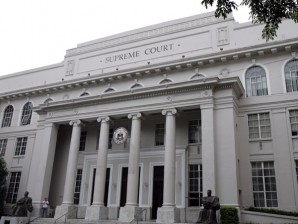8th petition vs anti-Cybercrime law filed at SC
MANILA, Philippines—The 8th petition questioning the legality of Republic Act 10175 or the Cybercrime Prevention Act of 2012 has been filed with the Supreme Court Wednesday.
Lawyer Melencio Sta. Maria. Sedfrey Candelaria, Amparita Sta. Maria, Ray Paolo Santiago, Gilbert Sembrano, Ryan Quan and the rest of the Ateneo Human Rights Center also asked the Supreme Court, in their 37-page petition, to stop its implementation through a temporary restraining order.
They said, implementation of the law would make them and all Filipinos suffer “under a law that endangers freedom of speech, right to privacy and the freedom of the press and all other rights argued in this petition.”
Respondents in their petition include Executive Secretary Pacquito Ochoa, Justice Secretary Leila DeLima, Interior and Local Government Secretary Manuel Roxas, National Bureau of Investigation, Philippine National Police.
In their petition, they asked the high court to strike down as unconstitutional the following provisions:
Article continues after this advertisementSec. 4(4), which criminalizes libel, not only on the internet, but also on “any other similar means which may be devised in the future;”
Article continues after this advertisementSec. 6, which raises by one degree higher the penalties provided for by the Revised Penal Code for all crimes committed through and with the use of information and communications;
Sec. 7, which provides that, apart from prosecution under the law, any person charged for the alleged offense covered will not be spared from violations of the Revised Penal Code and other special laws;
Sec. 19, which authorizes the DOJ to block access to computer data when such data “is prima facie found to be in violation of the provisions of this Act;” and
“It is the right of citizens and taxpayers of a country to have all laws passed without constitutional infirmity. It is their right to live under a system of valid laws which passed the legislative mill at the cost of the taxpayers’ money,” petitioners said.
“It is also their right to compel our public officials only to enforce laws which are within the mandates of the Constitution and not to enforce those that are void for being violative thereof.”
Petitioners said, the implementation of Sections 4(4), 5, 6, 7 and 19 of the law “will clearly result to a material invasion of the [constitutional rights] and constitutional mandate.”
“No citizen must be allowed even for a second to live under an infirm law that affects his or her freedom of expression and right to privacy,” the petition stated.
